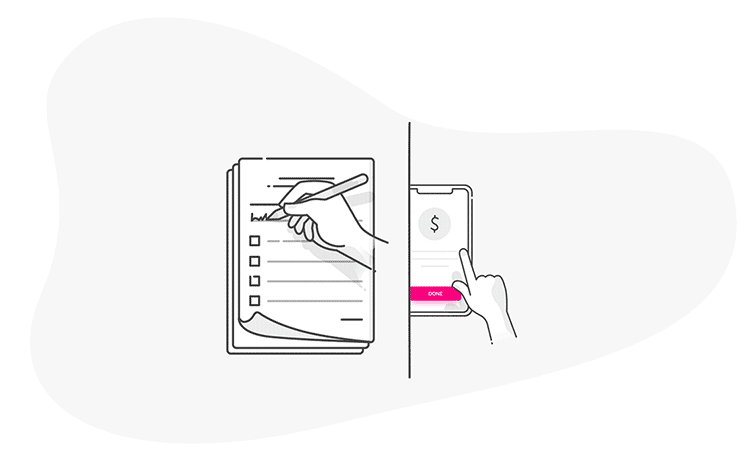- What does renters insurance cover in Ohio?
- What property damages does renters insurance in Ohio protect me against?
- How much is renters insurance in Ohio?
- Is renters insurance required in Ohio?
- What are the most common causes of renters insurance claims in Ohio?
- How much renters insurance do I need?
- How can I lower my renters insurance rate?
- Your Lemonade renters insurance quote in Ohio
Whether you’re a corporate exec in Columbus, a high school teacher in Cincinnati, or a curator in Cleveland, if you’re a tenant in Ohio you’ll want to cover your stuff with renters insurance. It’s a vital safety net for protecting against life’s uncertainties.
Let’s take a look at the ins and outs of renters insurance coverage for Ohioans.
What does renters insurance cover in Ohio?

Renters insurance in Ohio covers your stuff in all kinds of unfortunate circumstances, plus offers financial protection if you accidentally injure another person or damage their property. Here are all the different types of coverage that a standard renters insurance policy includes:
Personal Property
‘Personal property’ coverage protects your stuff, even if you’re out of your apartment or on the road. It includes things like theft, as well as damage from a variety of named perils.
Loss of Use
If you have to temporarily move out of your Columbus duplex due to covered losses (like a fire or windstorm), your ‘loss of use’ coverage could provide reimbursements for a temporary place to stay. It should also contribute $ for additional living expenses such as food, laundry, hotel parking, and more.
Liability protection
Okay, so you’re hanging out at your buddy’s crib in Cincinnati, and after a few too many microbrews you accidentally knock over his foosball table… which breaks. Bummer! The good news is that if you or anyone on your policy causes damage to someone else’s property or stuff—including their foosball tables!—then your insurer should have you covered for the damages.
Medical protection
Okay, so to make up for your foosball snafu, you invite your friend over for a home-cooked meal at your own apartment. After you’ve both eaten, he gets up to use the bathroom… and accidentally falls down a staircase. (You guys don’t have the best of luck.) In this case, another component of your policy will be a real lifeline. Your insurer covers medical costs if your guests get injured at your home, or if you accidentally hurt people outside of your home as well. But here’s a big thing to keep in mind: Renters insurance does not cover medical costs if you or someone residing with you are injured—only non-residents and people visiting.
Tweak your coverage
There’s no one-size-fits all equation for coverage. Make your best accounting of the value of your stuff, to get going. Your landlord also might require you to have a certain amount of personal liability renters insurance coverage. Don’t worry, changing your coverage options is simple with Lemonade’s Live Policy.

What property damages does renters insurance in Ohio protect me against?
A standard renters insurance policy covers your stuff for a number of different damages (or ‘perils’ in insurance speak), including theft, fire, vandalism, and water damage from things like a pipe bursting in your Akron apartment.
Here’s a list of the perils that are covered under your base policy:
- Fire or lightning
- Windstorm or hail
- Explosion
- Riots
- Aircraft
- Vehicles
- Smoke
- Vandalism
- Theft
- Falling objects
- Weight of ice, snow, or sleet
- Accidental discharge or overflow of water or steam
- Sudden and accidental tearing, cracking, burning, or bulging
- Freezing
- Volcanic eruption
How much is renters insurance in Ohio?
As of 2025, the average estimated cost of Lemonade renters insurance in Ohio ranges from roughly $10 to $15 a month.* However, the amount you pay will depend on several factors, like your deductible, how much coverage you need, and where in Ohio you live.
Is renters insurance required in Ohio?
There is no state law in Ohio requiring that you get renters insurance, but it is required by law that you comply with your lease. So, if your lease terms include having renters insurance, you’ll want to make sure that you’re covered.
And they won’t just take your word for it! Most landlords or property managers are going to ask for proof of insurance each time you renew your lease.
Why? Usually, landlords want to make sure you have enough renters insurance liability coverage within your policy. They might also check to make sure you have enough personal property coverage for your stuff.
Also, your landlord could ask to be made an interested party, meaning they’d be notified if you abandon your policy. So don’t think you’ll pull a fast one, signing up for a policy just to satisfy your landlord… and then canceling it right away.
What are the most common causes of renters insurance claims in Ohio?
Theft is generally the most common cause of renters insurance claims in Ohio. And, while property crimes like theft and robbery have been falling below the national average since 2019, these incidents still top the list of common renters insurance claims in the Buckeye State.
Fortunately, a standard Lemonade renters policy could cover your valuables if they’re stolen—whether at home or away from home.
Living in Ohio also means that your stuff is vulnerable to some natural threats. If, say, freezing temperatures cause a pipe to burst in your rental, spewing water all over your belongings, renters insurance could cover your stuff for the water damage. And, if the burst pipe renders your home temporarily unlivable, you could even receive reimbursement for additional living expenses while you’re away from home.
How much renters insurance do I need?
To figure out how much renters insurance you need, you should weigh how much you think you need in terms of your belongings and lifestyle against how much you would feel comfortable paying every month. Reducing your coverage amount will lower your premium, but you also want to make sure that you still have enough coverage should the worst ever happen.
As we previously mentioned, your policy has a few main categories:
- Personal property
- Temporary living expenses
- Personal liability & medical bills
You’ll need to select coverage amounts for each category, based on your specific needs for that category. If, for instance, you have $20,000 worth of personal belongings, then you’d want to get $20k worth of personal property coverage (rather than the $10,000 minimum) to make sure all of your stuff is covered.
On the other hand, when selecting your loss of use coverage, you should consider all of the expenses you could rack up beyond your normal daily budget (such as accommodations, food, laundry, your commute, etc) if your home were to become unlivable for an extended period of time.
Keep in mind: Before setting coverage limits, you should also consult with your landlord who may require you to have a certain amount of personal liability coverage.
Still not sure how much coverage to get? Check out our guide to how much renters insurance you need.
How can I lower my renters insurance rate?
Renters insurance rates are generally pretty affordable, but there are still some ways to cut down on costs. Here are a few:
- Adjust your deductible and coverage limits: Increasing your deductible and reducing your total coverage amount are both guaranteed ways to lower your premium. Just make sure that you’re comfortable paying your full deductible out-of-pocket if necessary and that you have enough coverage should disaster strike.
- Check for security devices: Check to see if your rental property has a fire alarm or burglar alarm—you could qualify for a discount.
- Pay in full: Paying your annual premium in one lump sum rather than month-to-month will earn you a discount with many insurance providers, including Lemonade.
- Bundle: One of the easiest ways to save money on your renters insurance is to bundle multiple policies. You can get a discount by bundling renters insurance with car insurance, for instance. Or, if you’re a pet owner, you can bundle renters with pet insurance by clicking the button below.
Your Lemonade renters insurance quote in Ohio
Yeah, we know, if we told you that signing up for insurance could be fun you’d probably groan and roll your eyes. But trust us—you might actually enjoy getting a policy.
That’s because we’ve used artificial intelligence and automation to streamline our customer experience. All it takes is a short conversation with Maya, our charming AI bot, who will guide you through the whole process smoothly. You’ll feel like you’re living in the future.
Best part? All leftover premiums go to a charity you choose at the end of the year through our Giveback program.
*Lemonade Insurance analyzed policy rates to calculate average renters premiums as of January, 2025. This analysis is based on Lemonade’s internal data and is meant for illustrative purposes only; quotes may vary depending on individual circumstances.
A few quick words, because we <3 our lawyers: This post is general in nature, and any statement in it doesn’t alter the terms, conditions, exclusions, or limitations of policies issued by Lemonade, which differ according to your state of residence. You’re encouraged to discuss your specific circumstances with your own professional advisors. The purpose of this post is merely to provide you with info and insights you can use to make such discussions more productive! Naturally, all comments by, or references to, third parties represent their own views, and Lemonade assumes no responsibility for them. Coverage and discounts may not be available in all states.




